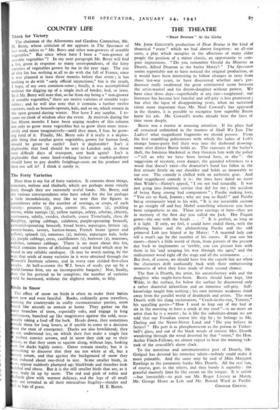irds in Snow
The effect of snow on birds is often to make their habits m new and even fanciful. Rooks, ordinarily great travellers, aming the countryside in crafty reconnaissance parties, seem rced like aircraft to remain at home. They gather on the wer branches of trees, especially oaks, and engage in long nferences, hunched up like magistrates against the cold, occa- onally taking a feed off the bark. Heads down, they sometimes eside there for long hours, as if unable to come to a decision
ut the state of emergency. Ducks are also bewildered; they not understand ice, on which their feet make a single line
perfect convict arrows, and in- snow they sink up to their reasts, so that they seem to squirm along, without legs, looking .en for ducks highly comic. Geese remain stately; but it is tonishing to discover that they are not white at all, but a rterY cream, and that against the background of snow they em reduced about one-third in size. Some smaller birds, in OW, appear suddenly plumped up; blackbirds and thrushes look ddled and obese. But it is the still smaller birds that are, as it ere, truly lit up by snow. The red and pink of robin and affinch glow with warmer delicacy, and the legs of all small ds are revealed in all their miraculous fragility—slender and






























 Previous page
Previous page